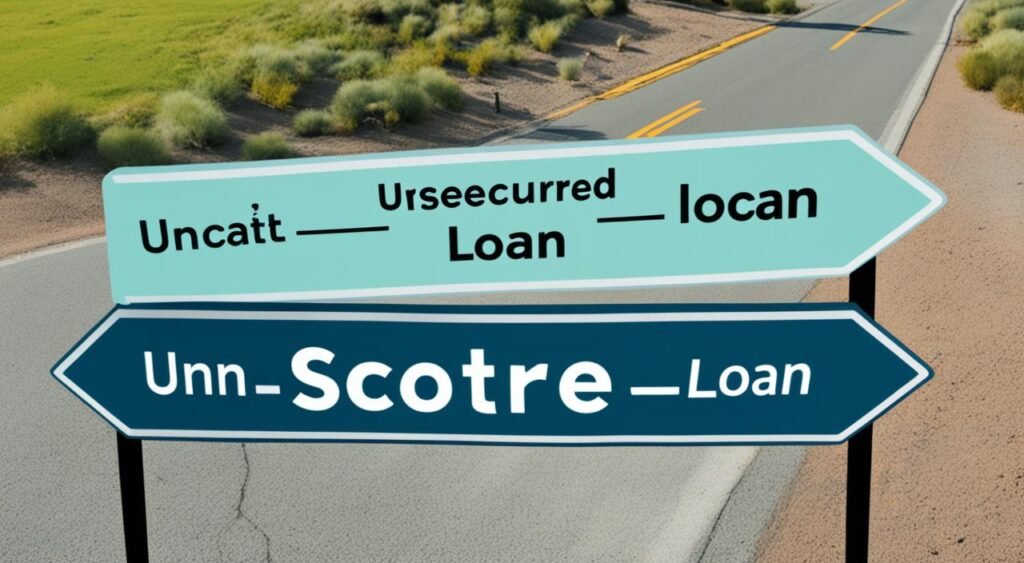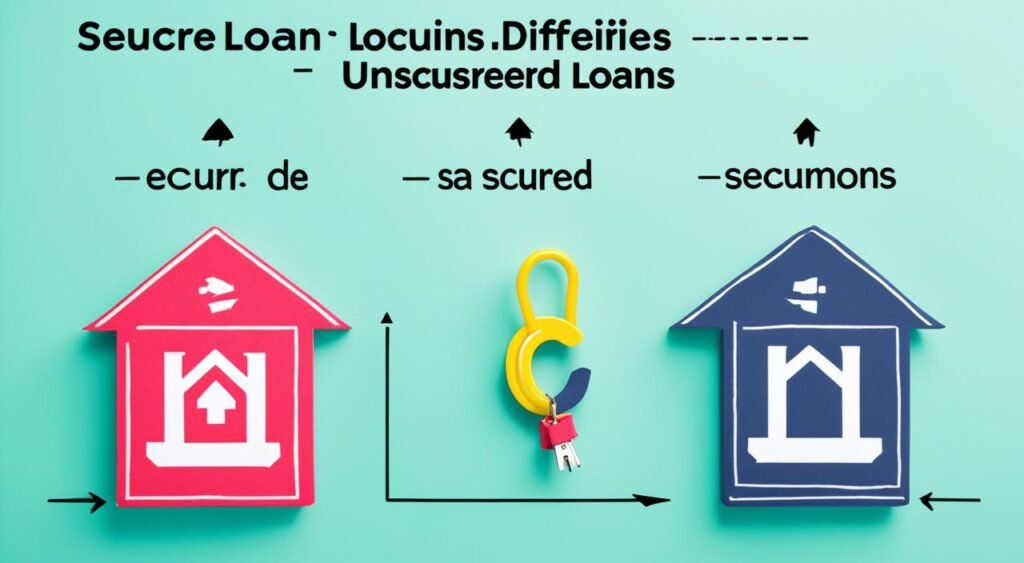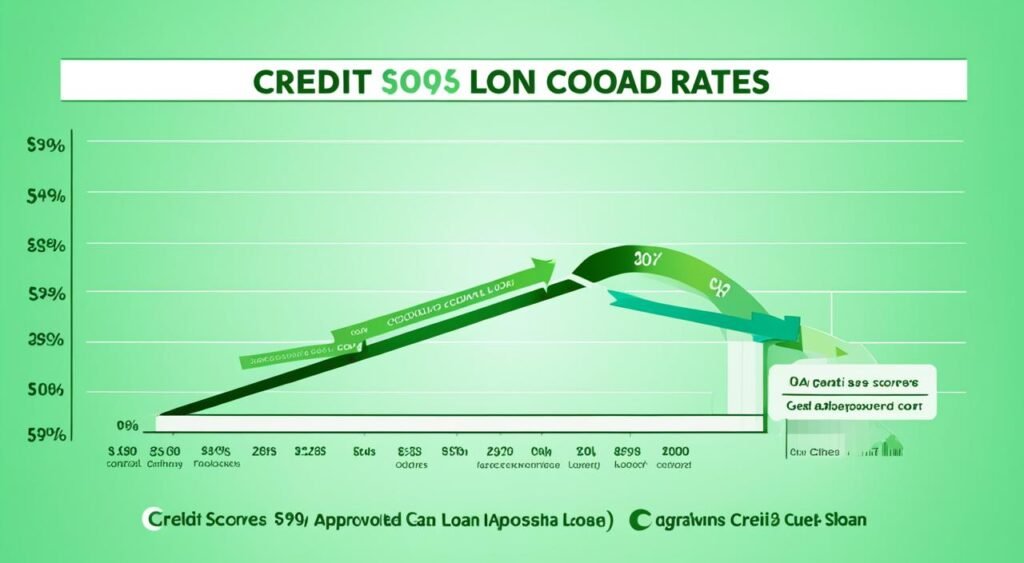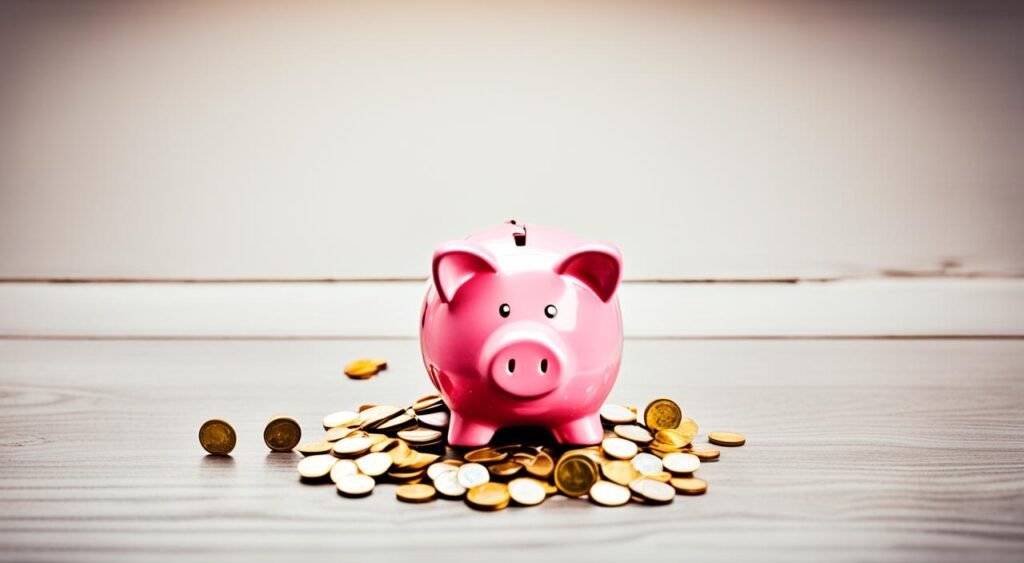Unsecured loans are a popular choice that don’t need collateral. They’re offered by banks, credit unions, and online lenders. Unlike secured loans, which use an asset as collateral, unsecured loans rely on the borrower’s credit and finances.
These loans can be used for many things, like paying off debt, improving your home, or covering medical bills. The amount you can borrow, the interest rate, and how you’ll pay it back depend on your credit score, income, and debt level.
To get an unsecured loan, you usually need a good credit history and a steady income. You should also have a low debt-to-income ratio. Lenders might look at your job history and assets too. If your credit is poor or your debt is high, you might still get a loan. But, you might pay more interest or have tougher loan terms.
Key Takeaways
- Unsecured loans don’t need collateral, making them easier to get.
- To qualify, you need good credit, steady income, and a manageable debt level.
- These loans can be used for many things, including paying off debt or fixing up your home.
- They usually have higher interest rates and terms than secured loans.
- Even with bad credit or high debt, you might still get a loan, but it might cost more.
Introduction to Unsecured Loans
Unsecured loans are a great choice for people who need money without having to offer collateral. Unlike secured loans, which need you to put up something valuable as security, unsecured loans or signature loans only look at your credit and ability to pay back. This makes unsecured loans different and offers special benefits and things to think about for those who might borrow.
Definition and Key Features of Unsecured Loans
Unsecured loans are loans that don’t require collateral. Lenders decide to give out unsecured loans based on your credit history, income, and financial situation. They don’t need you to offer any asset as security. This kind of loan is often called a signature loan because all you need to do is sign your name if you meet the lender’s requirements.
Differences Between Secured and Unsecured Loans
The main difference between secured loans and unsecured loans is collateral. Secured loans, like mortgages or car loans, need you to offer something valuable as security. On the other hand, unsecured loans don’t need any collateral. This means the lender takes a bigger risk. To make up for this risk, unsecured loans usually have higher interest rates and less favorable terms than secured loans.
“Unsecured loans provide a flexible financing option for borrowers who may not have the necessary collateral for a secured loan, but they come with their own set of considerations.”
How Unsecured Loans Work

Unsecured loans have different loan amounts, interest rates, and repayment times. They usually range from $1,000 to $100,000, with APRs from 6% to 36%. The repayment time can be from two to seven years, depending on the lender and your credit score.
Loan Amounts, Interest Rates, and Repayment Timelines
The loan amount you can get depends on your credit score, income, and debt. Lenders offer loans for various needs. Your credit score affects the interest rate you get. Those with great credit get lower rates, while those with lower scores pay more.
Repayment times for unsecured loans are usually 2 to 7 years. Longer terms mean smaller monthly payments but more total interest paid.
Application Process and Funding
Applying for an unsecured loan is easy, and many lenders let you apply online. This makes it simple to compare offers and pick the best one. After approval, you get the money in your bank account the same or next day.
You can get unsecured loans from online lenders, banks, and credit unions. The process varies by lender but is fast and convenient.
Unsecured Loan
An unsecured loan, also known as a signature loan, doesn’t need any collateral to get approved. Unlike secured loans, which use assets like a house or car as backup, unsecured loans rely on the borrower’s credit and finances.
Lenders look at your credit history, income, and debts to decide on the loan terms for an unsecured loan. If you can’t pay back the loan, the lender can’t take your stuff. But, your credit score will suffer.
Unsecured loans have some big pluses, like quick approval and flexible use of funds. But, they often have higher interest rates. This is because the lender is taking a bigger risk without any collateral.
| Feature | Unsecured Loan | Secured Loan |
|---|---|---|
| Collateral Required | No | Yes |
| Interest Rates | Higher | Lower |
| Approval Process | Faster | Slower |
| Lender Risk | Higher | Lower |
Unsecured loans are great for people who need to finance personal expenses. This could be for paying off debt or improving your home. Knowing the differences between secured and unsecured loans helps you choose the right one for your situation.
Types of Unsecured Loans
Unsecured loans come in different types. You can choose from personal loans, student loans, and credit cards. Each has its own benefits and drawbacks for borrowers.
Personal Loans
Personal loans are a top choice for unsecured financing. They can be used for debt consolidation, home improvement, or large purchases. Most personal loans are unsecured, meaning no collateral is needed.
Student Loans
There are two main kinds of student loans: federal student loans and private student loans. Federal loans usually have lower interest rates and flexible repayment plans. They might even offer forgiveness options. Private student loans often have higher rates and strict rules, best for filling gaps after federal loans are used up.
Credit Cards
Credit cards let you borrow money for spending, which you must pay back each month. Most consumer credit cards are unsecured. But, they can have higher interest rates than loans. Missing payments can lead to extra fees.
| Loan Type | Interest Rates | Repayment Terms | Eligibility Requirements |
|---|---|---|---|
| Personal Loans | 6% – 36% | 1 – 7 years | Good credit score, steady income |
| Federal Student Loans | 4.99% – 7.54% | 10 – 25 years | Enrollment in eligible educational program |
| Private Student Loans | 3.5% – 13.95% | 5 – 20 years | Good credit, steady income, creditworthy cosigner |
| Credit Cards | 15.99% – 24.99% | Revolving | Good credit score |
Unsecured Loans vs. Secured Loans

When you need to borrow money, you have two main choices: secured loans and unsecured loans. The key difference is whether you need to offer collateral or not. Knowing the pros and cons of each can help you pick the right one for your financial situation and how much risk you can handle.
Secured Loans: Collateral Minimizes Lender Risk
Secured loans ask you to use something valuable like a home or vehicle as collateral. This makes the loan less risky for the lender. So, you might get lower interest rates than with unsecured loans. But, if you can’t pay back the loan, the lender could take your asset.
Unsecured Loans: Faster Approval, Higher Rates
Unsecured loans don’t need any collateral. This is good if you don’t want to risk your assets. But, you’ll likely pay higher interest rates. Getting approved for unsecured loans is quicker because lenders don’t check your collateral’s value.
Choosing between a secured loan and an unsecured loan depends on your financial situation and how much risk you’re okay with. Think about the pros and cons of each to make the best choice for you.
Who Should Get an Unsecured Loan?
Unsecured loans are great for people who need money but don’t want to risk their assets. They’re perfect for those with good credit and reliable income. These factors make it easier for lenders to trust them.
One good use of unsecured loans is for debt consolidation. By getting an unsecured loan to pay off several high-interest debts, people can make one easy payment. This can also save money if they get a lower interest rate.
Unsecured loans are also great for big buys. If someone doesn’t want to risk their home or car, these loans offer a way to get what they need. This approach gives peace of mind and keeps assets safe.
Scenarios Where Unsecured Loans Are Suitable
- Debt consolidation: Combining high-interest debts into one, possibly lower-interest loan, makes paying back easier and can save money.
- Financing large purchases: Unsecured loans let people buy big things without risking their assets.
- Good credit and reliable income: Those with strong finances are more likely to get unsecured loans with better terms.
Knowing when unsecured loans work best helps borrowers pick the right financing option. This way, they can meet their financial goals without risking their assets.
Qualifications for an Unsecured Loan

Lenders check how likely you are to pay back an unsecured loan. They look at your credit score, income, and debt-to-income ratio (DTI). These help them see if you can handle the loan payments.
Credit Score Requirements
Lenders want a credit score of about 700 or more for the best rates. A high credit score shows you’ve been good with credit. They like to see you have a variety of credit accounts, low credit card balances, and a history of paying on time.
Income and Debt-to-Income Ratio
Lenders also check your income and debt-to-income ratio (DTI). The DTI is your total monthly debt divided by your monthly income. They want a DTI of 36% or less. This means you can afford the loan payments.
Other Factors Considered by Lenders
Lenders don’t need collateral for an unsecured loan. But, they might look at your assets and employment status. Having a steady income and some savings or assets shows you can pay back the loan.
| Qualification Factor | Typical Lender Requirement |
|---|---|
| Credit Score | 700 or higher |
| Debt-to-Income Ratio (DTI) | 36% or less |
| Income | Stable, verifiable |
| Assets | Savings or other assets |
Knowing what lenders look for can help you improve your chances. By working on your finances, you can get a better loan deal.
Where to Get Unsecured Loans

Looking for an unsecured loan? You have many options. Online lenders are a top choice, offering fast funding and flexible credit requirements unlike traditional banks. They provide personal loans and can give you money in 1-2 business days.
Banks and credit unions also have unsecured loans. If you already bank there, check out their loan options. Credit unions are not-for-profit and offer personal loans, but you must join first.
Online Lenders
- Offer flexible credit requirements and faster funding
- Provide a range of unsecured lending products, including personal loans
- Disburse funds within 1-2 business days in many cases
Banks and Credit Unions
- Banks may offer unsecured loan options, especially for borrowers with existing relationships
- Credit unions, as not-for-profit cooperatives, can be a source for unsecured personal loans
- Borrowers will need to become a member of a credit union to qualify for their unsecured loan products
“Unsecured loans can be a valuable financial tool for those with good credit, offering access to funds without the need for collateral.”
Applying for an Unsecured Loan
Applying for an unsecured loan is easy and can be done in a few steps. You might want to apply for an unsecured loan for personal needs, to pay off debt, or for another reason. Knowing the main steps makes the process smoother and more likely to succeed.
Steps to Apply for an Unsecured Loan
- Check Your Credit Score: Before applying for an unsecured loan, check your credit score and report. This shows how likely you are to get the loan and what terms you might get.
- Prequalify with Lenders: Many lenders let you prequalify for an unsecured loan. This lets you see possible loan offers without a hard check on your credit, which won’t hurt your score.
- Gather Required Documentation: When you’re set to apply for the unsecured loan, you’ll need to provide some documentation. This includes proof of income, job details, and personal ID.
- Submit the Loan Application: After you have all the info, you can apply for the unsecured loan with your chosen lender. You can do this online, over the phone, or in person.
- Wait for Loan Approval: The lender will look over your application and documentation to decide. If they say yes, you’ll get the loan money, usually in a few business days.
The application process and what lenders look for can change. It’s important to look around, compare offers, and pick the loan that suits your financial situation and goals best.
Consequences of Defaulting on an Unsecured Loan
Defaulting on an unsecured loan can lead to serious issues for borrowers. If a borrower misses payments, the effects can be severe and long-lasting. One major effect is the negative impact on the borrower’s credit score. Late or missed payments get reported to credit bureaus, causing a big drop in credit rating.
Defaulting also means facing collections activities and potential legal action. Lenders might send the debt to a collection agency, leading to constant calls and efforts to get back the money owed. In some cases, lenders could take legal steps, like taking part of your paycheck or putting a lien on your assets.
The default stays on your credit report for up to seven years. This makes it harder to get future financing, like loans, credit cards, or rental agreements. This can lead to a cycle of debt and financial instability.
“Defaulting on an unsecured loan can have a devastating impact on a borrower’s financial future, making it crucial to prioritize timely repayment and explore alternative options if facing financial difficulties.”
| Consequence | Impact |
|---|---|
| Credit Score Impact | Significant drop in credit score |
| Collections and Legal Action | Collection agency involvement, potential for wage garnishment or asset liens |
| Future Financing Difficulties | Challenges in obtaining loans, credit cards, or rental agreements |
If you’re struggling to pay back an unsecured loan, act quickly. Talk to your lender and look into debt restructuring or hardship programs. This can help avoid the serious effects of default on unsecured loan. installment loan, credit card debt, repay the loan , consolidate debt are unsecured loans don’t require collater.al and don’t repay your loan .
Also Read: Secured Loans Unveiled: Key Facts And Tips
Conclusion
Unsecured loans let people borrow money without using their personal stuff as collateral. They usually have higher interest rates and stricter rules for getting approved. But, they are faster to get and don’t risk your stuff if you can’t pay back.
These loans are good for paying off debt or buying big things. But, you should think about if you can pay it back. If you can’t, it can hurt your credit score and lead to legal trouble.
It’s important to know the good and bad of unsecured loans before deciding if it’s right for you. Think about your financial situation and the risks involved. This way, you can see if an unsecured loan fits your financial goals.
FAQs
Q: What is an unsecured personal loan?
A: An unsecured personal loan is a type of loan that does not require collateral. This means that you do not have to pledge any asset, such as a house or car, to secure the loan.
Q: Who qualifies for an unsecured loan?
A: To qualify for an unsecured loan, you typically need to have a good credit score and a stable income. Lenders will also consider your debt-to-income ratio and your employment status.
Q: What are some alternatives to unsecured loans?
A: Some alternatives to unsecured loans include secured loans, lines of credit, and balance transfer credit cards. Each option has its own pros and cons, so it’s important to compare them carefully.
Q: What are the cons of unsecured loans?
A: The main cons of unsecured loans are higher interest rates and stricter eligibility requirements compared to secured loans. Unsecured loans also typically have lower maximum loan amounts.
Q: How does debt consolidation work with an unsecured loan?
A: Debt consolidation with an unsecured loan involves taking out a new loan to pay off multiple existing debts. This can help streamline your payments and potentially lower your overall interest costs.
Q: Are there specific requirements for unsecured loans?
A: Each lender may have different requirements for unsecured loans, but common criteria include a good credit score, stable income, and a low debt-to-income ratio. Some lenders may also require a minimum loan amount.
Q: What are some of the best unsecured personal loan options available?
A: Some of the best unsecured personal loan options offer competitive interest rates, flexible repayment terms, and quick approval processes. It’s recommended to compare multiple lenders to find the best option for your needs.
